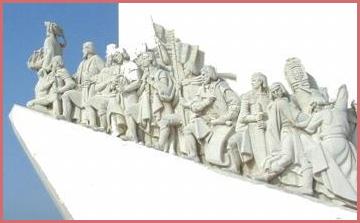Henry the Navigator (Portuguese: Henrique o Navegador)
Portuguese prince who sponsored voyages of discovery, b. 4 March 1394 (Porto, Portugal), d. 13 November 1460 (Vila do Infante, near Sagres).
 Henry was the third son of king John I of Portugal. His biographer Gomes Eanes de Zurara reports that the three princes wanted to complete their education in military matters with the capture of a real city, so their father decided to attack the Moroccan city of Ceuta. To guarantee the success of the venture he spread rumours about an impending attack elsewhere, and Ceuta was taken unprepared and with little effort in 1415.
Henry was the third son of king John I of Portugal. His biographer Gomes Eanes de Zurara reports that the three princes wanted to complete their education in military matters with the capture of a real city, so their father decided to attack the Moroccan city of Ceuta. To guarantee the success of the venture he spread rumours about an impending attack elsewhere, and Ceuta was taken unprepared and with little effort in 1415.
Henry was appointed governor of Ceuta, which made him responsible for the city's defences but did not require his presence there. He soon showed an interest in all things related to seafaring. In 1419 he retired from the court and at the age of 25 established a small court of his own in the Portuguese province of the Algarve, where he had been appointed governor. His court attracted the best men with knowledge in seafaring, astronomy, navigation, cartography and instrument making and spawned many innovations, including the design of the Portuguese caravel, the type of ship used some 70 years later in Columbus' voyage to America.
Henry now began to sponsor voyages of exploration along the western African coast. In 1420 he became a grand master of the Order of Christ, the supreme order sponsored by the pope to spread the area of European influence against the Muslim empires.
Henry's overarching interest was the art of seafaring. There is no evidence that he had a leaning towards ascetic life; but the seafaring voyages required significant investment. To be able to pursue his interest, Henry willingly followed the Order's rules of chastity and had a red cross placed on the sails of all his vessels. This guaranteed him the funds to support his ships.
The declared aim of the sponsored voyages - besides the spreading of Christianity - was to find a way around Africa towards India, which would avoid direct confrontation with the Muslim empires that controlled the land route. Ships sponsored by Henry rediscovered Madeira, which had been visited a century earlier by Genuese ships, in 1418. They discovered and colonized the Azores. In 1445 they reached the Sénégal and Gambia Rivers, then thought to be two branches of the Nile. The Cape Verde Islands were reached in 1456.
The continued occupation of Ceuta proved a drain on the state's finances. Henry and his younger brother Pedro suggested to improve the situation by taking the neighbouring Tangier as well. Their raid on the city in 1437 turned into a disaster; Pedro had to be left as a hostage and died in captivity six years later.
The rising expense of the sea voyages also generated criticism, and Henry had to find ways to make the voyages pay for themselves. His hopes to find gold in the west African states did not materialize except for some gold dust; but the slave trade proved profitable and soon became the basis of his sponsored voyages. In 1448 Henry had a fort and a warehouse built on Arguin Island off the coast of Mauritania as a base for the slave trade. He was still heavily in debt when he died.
The rising trade and commerce economy of the 14th century required someone who could master the seas. Henry was the right man at the right time. He had the intense interest in everything nautical and the ability to inspire others. He took financial support from wherever he could find it and made himself an instrument of European expansionism.
But unlike many that took to the seas on the ships he had helped to develop, Henry was not a ruthless operator and had no desire for power. On several occasions he was called to participate in the feuds of the royal court and always tried to act as a peacemaker. When king Afonso V raided the Moroccan city of Alácer Ceguer (today's Ksar-es-Shrhir) in 1458 Henry, who had been placed in charge of the terms of surrender, surprised everyone by his leniency.
Henry never went on a voyage of exploration himself, but his role in the rise of Portugal as a maritime power is rightly remembered through his byname "the Navigator." Portugal still holds him in high regard and has erected a monument in his honour.
Reference
Nowell, C. E. (1995) Henry the Navigator. Encyclopaedia Britannica 15th ed.

The Monument to the Discoveries on the waterfront of Belém, Lisbon (Portugal), erected 1960 to commemorate the 500th anniversary of the death of Henry the Navigator.
home
 Henry was the third son of king John I of Portugal. His biographer Gomes Eanes de Zurara reports that the three princes wanted to complete their education in military matters with the capture of a real city, so their father decided to attack the Moroccan city of Ceuta. To guarantee the success of the venture he spread rumours about an impending attack elsewhere, and Ceuta was taken unprepared and with little effort in 1415.
Henry was the third son of king John I of Portugal. His biographer Gomes Eanes de Zurara reports that the three princes wanted to complete their education in military matters with the capture of a real city, so their father decided to attack the Moroccan city of Ceuta. To guarantee the success of the venture he spread rumours about an impending attack elsewhere, and Ceuta was taken unprepared and with little effort in 1415.